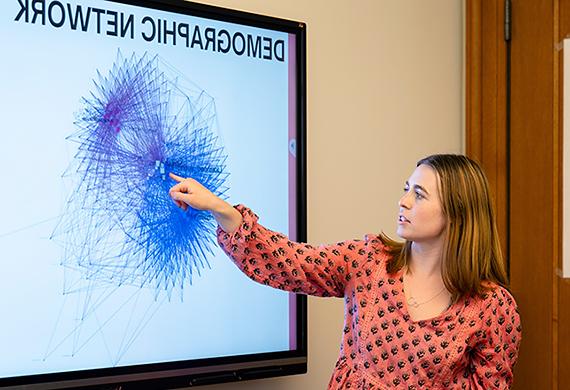How AI Can Help Students Better Understand Sentiment Behind Polling Numbers

November 5, 2024 — In collaboration with the School of Computer Science and Mathematics, researchers at the Marist Poll are exploring the use of AI and machine learning models to help students dive into more nuanced understanding of public sentiment behind poll results.
The project’s goal is to glean deeper insights about public opinion in connection to political polls and other issues, enabling students to go beyond just the data points.
“It's not just about Candidate A versus Candidate B," said Stephanie Calvano, Director of Data Science and Technology at the Marist Poll. "It's about explaining relationships within the data."
A group of computer science students, under the guidance of faculty advisor Dr. Reza Sadeghi, is undertaking hands-on research with real-time Marist Poll survey data to understand the national electorate, who votes, and why. The research will also help to understand what each computer model can or cannot tell us about American public opinion.
Computer science major Gabrielle Knapp '26, who is also pursuing a major in Spanish and a minor in information systems, first collaborated with the Marist Poll on other research projects that took a comprehensive look at Americans' experiences and expectations for the future. The Marist Poll team was impressed by her findings and her eagerness to learn more, which helped spark the idea for this new collaboration with the School of Computer Science and Mathematics.
"It's a way to apply skills that we're learning in the classroom, but in a way that we wouldn't be able to in a regular class," said Knapp '26. "That's what's been so valuable."
"When Gabrielle presented to us, we were blown away. Seeing the relationships in a different way was incredibly helpful and shed a huge light on a lot of the research we were doing," said Calvano.
Gabrielle Knapp '26 presenting research to an assembled group at the Marist Institute for Public Opinion. Photo by Nelson Echeverria/Marist College.
Gabrielle, a self-professed political junkie, always followed the news closely. After presenting her work as part of a research fellowship in the School of Computer Science and Mathematics, she realized she was eager to apply her burgeoning data analysis skills to the field of political data.
“This fellowship helped me figure out that I like data analysis,” said Gabrielle. “It has made me a little more critical of when I see a number in the headlines, like ‘60% of Americans think this,’ — I think harder when I see polling numbers now.”
This type of collaboration exemplifies Marist’s interdisciplinary approach to learning, bringing together students from diverse academic backgrounds to tackle real-world challenges.
“We are covering a wide variety of machine learning and AI algorithms to analyze the data and provide better insight to the Marist Poll about the collective data,” said Dr. Sadeghi, assistant professor of computer science.
Abel Scholl '26, a computer science major with minors in cybersecurity and information technology, was part of Dr. Sadeghi's database management class when he asked about Abel's interest in doing this kind of research.
“It was my first research opportunity, and of course when you get that offer, you take it,” Abel said.
Working with the Marist Poll’s data helped Abel realize academic interests that they had not previously explored.
“I’m finding out that I enjoy public opinion and working with data more than I thought that I did,” Abel said. “I’m learning more about myself in being able to work with the Marist Poll and it’s made me more aware of the political climate in the United States and my community.”
"The Marist Poll has a long history of collaborating with other departments and faculty on the Marist campus," said Dr. Lee Miringoff, Director of the Marist Institute for Public Opinion. "It is rewarding to see students link their education inside the classroom with real-world experiences and current events."
Research presentation at the Marist Institute for Public Opinion. Photo by Nelson Echeverria/Marist College.
This collaboration has significant implications beyond the current election cycle.
Through this dynamic partnership, Marist is redefining the future of public opinion research by converging data and technology to reveal deeper truths that shape our society. As the 2024 election cycle unfolds, the insights gained from this collaboration will continue to have a lasting impact on both the Marist Poll and the students driving this innovative work.
“I feel like everyone wants to feel like what they do is fun and interesting,” said Abel. “So it’s been very formative for me to stop and take a moment to realize, ‘Wow, my job is cool!'”



